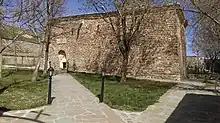Sir, West Azerbaijan
Sir (Persian: سير, romanized: Sīr; Assyrian Neo-Aramaic: Seiri) is a mountainous area and a village in Baranduz Rural District, in the Central District of Urmia County, West Azerbaijan Province, Iran. At the 2006 census, its population was 134 people, in 32 families.[1] In English the place has been subject to various spellings due to early transliteration including Seer, Seyr,[2] and Seir.[3]
Sir
سير Seiri, Seyr, Seer, Seir | |
|---|---|
village | |
 Assyrian Mar Sargis shrine in Sir | |
 Sir | |
| Coordinates: 37°28′09″N 45°02′05″E | |
| Country | |
| Province | West Azerbaijan |
| County | Urmia |
| Bakhsh | Central |
| Rural District | Baranduz |
| Population (2006) | |
| • Total | 134 |
| Time zone | UTC+3:30 (IRST) |
| • Summer (DST) | UTC+4:30 (IRDT) |
History
Sir is located the historically significant stone church of Mar Sargis, a shrine visited by the faithful for healing, both Christian and Muslim. Due to its fresh mountain air, Sir became the summer station for both English and American missionaries based in Urmia.
On 1800s a proto-evangelical English missionary led by Sir John White and Elisabeth Hobart also built a small worship place in Urmia, known as 'Ojag-e Sir' (Sir's Henge, God's House of Sir) later renamed and converted to Kelisay-e Hazrat-e Maryam (The Church of Saint Mary). There is a remaining room of mentioned sacred address which is located in the close outskirts of Janveslou village, foothill of Sir's Mountain. The village colloquially named Janveslou/Village of John and Elisa and it is widely known to have historically offered safety to various displaced and persecuted peoples of faith. It is there that many of American missionaries and their children and wives are buried in the specially designated cemetery, such as Joseph Plumb Cochran (1855–1905).[4]
Notable people
- Joseph Gallup Cochran (1817–1871), missionary,[5] buried in Sir
- Ana Diamond (born 1996), human rights activist
- Jacob David (1873–1967), pastor and relief worker, born in Sir[2]
- William Ambrose Shedd (1865–1918), missionary, born in Sir[3]
References
- "Census of the Islamic Republic of Iran, 1385 (2006)" (Excel). Statistical Center of Iran. Archived from the original on 2011-09-20.
- "David, Jacob". Encyclopædia Iranica. December 3, 2010.
- Shedd, Mary Lewis (1922). The Measure of a Man: The Life of William Ambrose Shedd, Missionary to Persia. George H. Doran Company. p. 35.
- Sheikhi, Siamak; Mobaraki, Kazhal; Ahmadzadeh, Jamal; Akhavan, Ghazal; Derafshpour, Leila (2020-08-01). "In Honor of Dr. Joseph Plumb Cochran, the Founder of the First Modern Iranian Medical School". Journal of Research on History of Medicine. 9 (3): 179–188. ISSN 2251-886X.
- Biographical Record of the Alumni of Amherst College, During Its First Half of the Century 1821–1871. W. S. Tyler (contribution). Amherst College. 1883. p. 189.
{{cite book}}: CS1 maint: others (link)